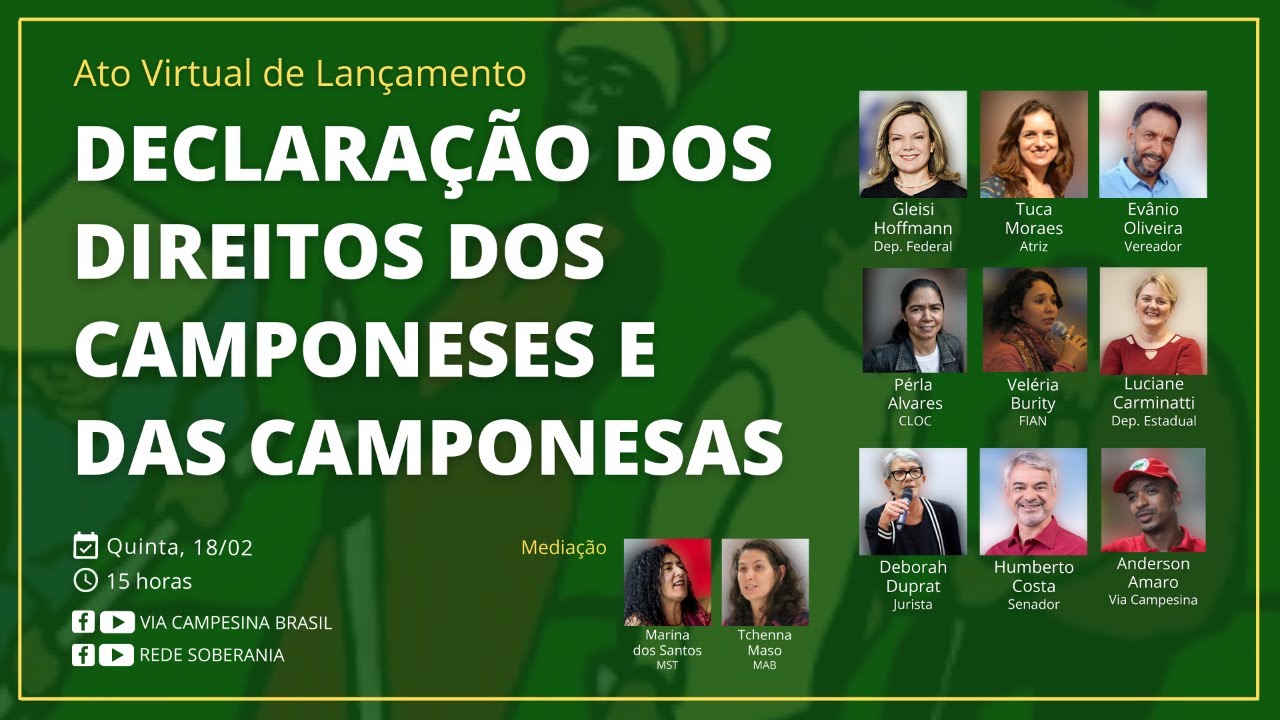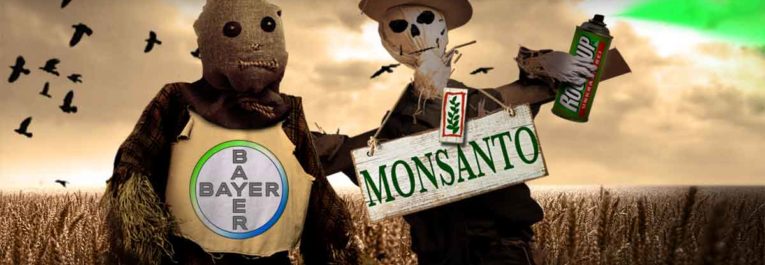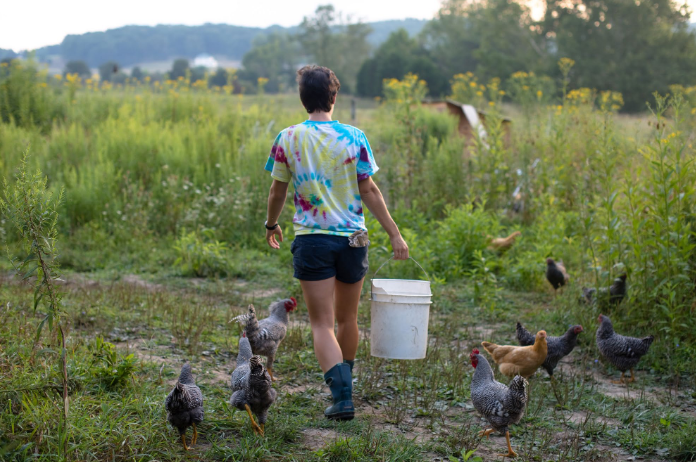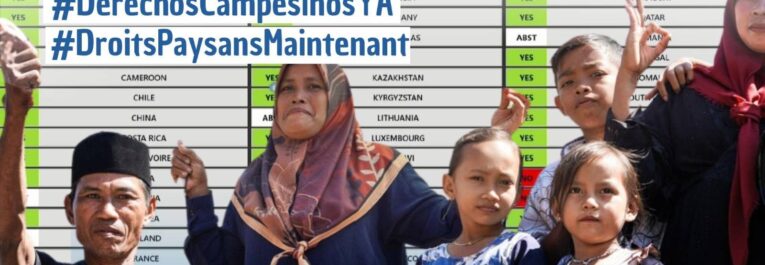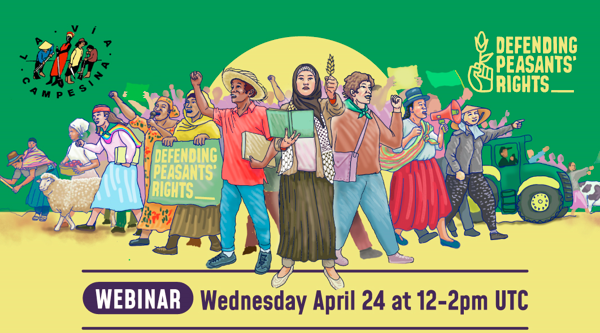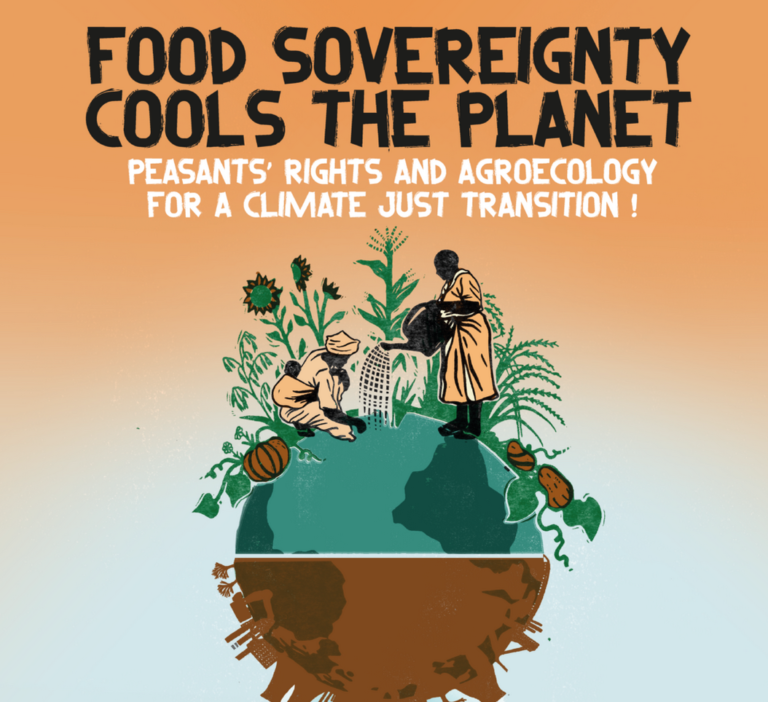Launching the UNDROP booklet in Brazil: Potency, hope and resistance!
After nearly two decades of struggle to advance the peasants’ rights agenda in the international fora of the United Nations, the UN Declaration on the Rights of Peasants and Other People Working in Rural Areas was finally adopted in 2018. What a ground-breaking victory for the several social movements and organisations that persistently fought for it! As every victory shall be celebrated, in Brazil the launching of the Portuguese version of the UNDROP booklet was covered with music, poetry and inspirational speeches given by social movements’ representatives as well as important politicians and nationally recognised intellectuals.
The online format of the event held live on Via Campesina Brazil’s Youtube channel facilitated the participation of many peasants and militants from across the country, who in addition to delivering strong speeches also chanted songs and recited poems that conveyed a mixture of the subjectivities that characterise their daily struggles. These artistic and symbolic elements that lie at the heart of what movements such as the Brazilian Landless Workers Movement (MST) call “mística” indeed brightened the event all throughout. While I encourage our readers to perceive them by watching the video recording, this article will be dedicated to highlighting other key points of this potent launching event.
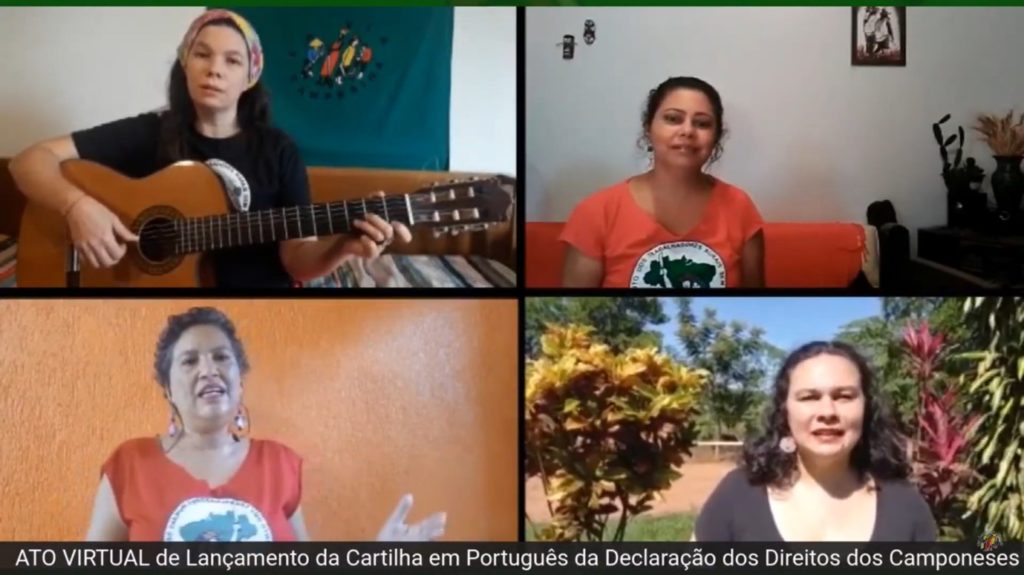
The moderation of the meeting was joyfully carried out by Marina dos Santos, who is a militant of the MST, and Tchenna Maso, who represented the Movement of Dam Affected Peoples (MAB) – both movements are members of La Vía Campesina Brazil. As the constant smile on their faces revealed the valuable sense of achievement the UNDROP has brought to peasants in Brazil and worldwide, part of their messages addressed the importance of widely circulating the declaration’s booklet within the national peasantry and amongst their networks of social movements. Once the great struggle to adopt this Declaration on Peasants’ Rights at the United Nations has come to a celebratory end, a new struggle for the implementation of the UNDROP on global, regional, national and local levels is now kicking off.
“We made this effort, as peasants, to build this declaration that is ours, to translate this declaration into Portuguese, and now we are going to implement it in our country! (…) Everyone can look for the UNDROP booklet in the Portuguese version on the MST, MAB, MMC, MPA websites. Let’s spread it widely on our whatsapp, pass it along to everyone; let’s organize workshops in our territories to be able to spread this declaration to all peasants. (…) Let’s circulate the Declaration in our media channels so that we can take ownership of this content and take up the challenge of making Brazil advance in the implementation of this declaration. Let’s start to use it in our claims and revindications.” – Tchenna Maso (MAB representative)
“This declaration is the result of the struggles, demands, resistance, and the achievements of the rural peoples. It sets in motion a tool that allows us to build public policies, which allows us to put pressure on parliamentarians in all spheres (municipal, state, federal), and also allows us to work with the perspective of eliminating social injustices and developing policies to strengthen agrarian reform and family peasant agriculture throughout our country. (…) It is very important that all the militancy of the rural movements, that the allies in the struggle for land, for agrarian reform, for better policies and better conditions of life in the countryside use this booklet, this declaration, as a didactic instrument for our base in the sense of promoting the rights that are guaranteed in this declaration as an awareness-raising process about the multiple struggles, confrontations, conflicts, etc. So, we believe that this achievement and this launching of the declaration here in Brazil come to strengthen our tripod of the popular movement’s struggles (organisation, training and foundation work, and the struggle) in the sense that we strengthen ourselves and continue our process of struggle and resistance. So, it’s an immense joy for us.” – Marina dos Santos (MST representative)
The event was also an important arena for consolidating relations between social movements and like-minded parliamentarians who are now aware of the existence of the UNDROP and will join forces to push for its implementation at the national level. In their speeches, parliamentarians of the Workers’ Party (PT) praised the UNDROP and reassured the key role played by Brazilian peasants in feeding the nation and protecting its environment through sustainable practices. Gleisi Hoffmann, a Federal Congresswoman and president of PT reinforced the party’s commitment to supporting Brazilian peasants in their common struggle for food security in Brazil, while the Senator Humberto Costa (PT) personally committed to be an active voice for peasants’ rights in the Brazilian Senate.
“I want to salute the launching of the booklet on the rights of peasants. Having the rights guaranteed for those who produce food for the people is fundamental and is part of our fight for food security. The PT will always be on the side of those who guarantee that the Brazilian people have sustenance and development. A big hug to you all and count on us in this fight.” – Gleisi Hoffmann (President of the Workers’ Party, PT)
“Family agriculture or peasant agriculture in Brazil plays a very important role for our country, whether from an economic point of view because its production represents a wealth for our country, or from the point of view of guaranteeing the food that is consumed on a daily basis by all Brazilians. In addition, it is an activity that guarantees the occupation, work and employment of millions and millions of Brazilians who otherwise would certainly be thickening the stripes of impoverished people who live in large Brazilian cities. (…) I would also like to establish a commitment here today. Today I already have a very close relationship with the landless workers’ movements, with the rural workers’ movements. I would like to strengthen these relations, I would like to make my mandate available to the Senate so that we can present projects and proposals that are aligned with the promotion of the rights of those who work in peasant and family agriculture. And I want to make myself available to continue to be one of the voices in parliament fighting for family farming and the rights of rural workers in our country.” – Humberto Costa (Senator, PT)
On this occasion, politicians were also represented by the peasant militant of the Small Farmers’ Movement (MPA) Evânio Oliveira, who has an ongoing mandate as city councillor of Malhada das Pedras (State of Bahia). In his speech, delivered directly from his plantation field, Evânio highlighted the importance of the UNDROP in creating the space for states and governments to further recognise the importance of rural areas and rural workers – especially in relation to the country’s economic sector.
“For us it is of enormous significance that the UN declares the rights of peasants. This category, this class, are those who fight every day to guarantee food on the table of the world population (…) This declaration will open spaces so that nations, governments, organisations and entities may recognize the countryside as an important space. But, more than that, it values, defends and brings empowerment to rural peoples so that they can have dignity and also play the important and strategic role they have always played in the history of humanity: to produce healthy food while defending and preserving biodiversity. (…) Rural men and women have an enormous importance in the economy of our municipalities, in the solidarity economy, in the economy of families. Finally, this declaration is of paramount importance and we need to value it, but to value it we need to increasingly instrumentalise the debate and, at the same time, build instruments so that this Declaration will truly have an effect on the lives of those who fight for a piece of land, who fight for the production of healthy food and who fight for dignity and diversity in rural areas”. – Evânio Oliveira (City councillor and MPA representative)
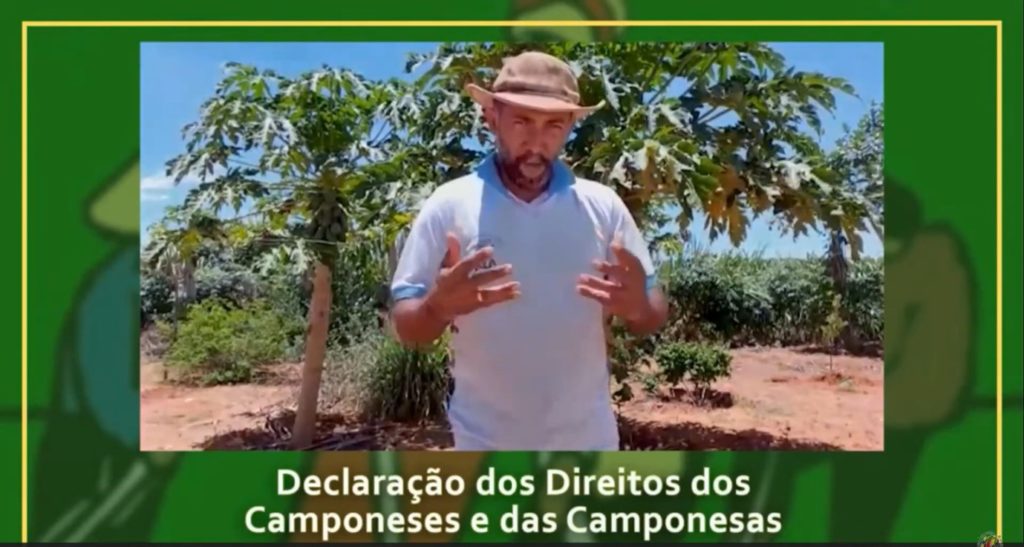
The widely recognised Brazilian human rights jurist Deborah Duprat also shared her views on the declaration and emphasised the fact that the UNDROP is a direct result of a long-term peasant struggle and mobilisation. According to her, the declaration evidences the perverse treatment given to peasants by state nations as well as the multiple violations suffered by rural peoples in several domains of life. She also highlights the unconstitutional measures taken by Brazil’s current federal government in its attempts to review the national human rights policy without civil society participation.
“I think we need at this moment of celebration to very strongly emphasize the fact that this declaration is the result of organised peasant struggles. (…) I emphasize this at a time when the Brazilian government is trying to review the national human rights policy exclusively with government agencies and excluding social participation, which besides being unconstitutional also affronts numerous treaties and conventions signed by Brazil. (…) The declaration recalls that these people who are so important in rural areas are targets of violence of all kinds:
- in access to land (through the refusal of States to advance agrarian reform and territorial rights for these people);
- in the lack of recognition of the dignity of their work (the declaration reinforces various documents produced in the context of the ILO);
- in access to adequate food (despite producing food adequately, these are peasants who are victims of extreme hunger);
- in the rights to education both for peasants and their children; and in their cultural rights.
Therefore, the declaration makes visible how the national state treat this segment of the Brazilian population in such a perverse way. I think it is also necessary to emphasise the importance of this translation into Portuguese for the incorporation [of the UNDROP] into daily struggles, but also for [its] incorporation into our internal law, into our justice system.” – Deborah Duprat (Brazilian Jurist)
As the largest transnational agrarian movement closely involved in the struggle to have the UNDROP recognised and adopted at the United Nations, La Vía Campesina was officially represented in this launching event by two representatives of its Latin American Coordination of Rural Organizations – CLOC: Perla Alvarez, member of the Conamuri (Paraguay); and Anderson Amaro, member of the MPA (Brazil). While recognising the declaration as a valuable tool in the collective struggles of peasants, they highlighted the contribution it brings in identifying the often-invisible peasant category as rights-holders and key subjects in the global society.
“This declaration is the product of our struggles, of our hopes placed in a document that serves as another tool for struggle like those we develop in our lands, like those we develop in our daily walk. This tool – the declaration – somehow summarises part of our claims for the enjoyment of our rights as rural people who had been historically made invisible. In this document, for the first time, we are recognized as peasants, people who live and work in rural areas. It seems to me that this is an important issue that we have to put forward and that we can use this declaration to make ourselves respected as people, as subjects, because often we are not seen and we are very important because we produce food and produce life, not only for us, but for all humanity.” – Perla Alvarez (Conamuri, CLOC)
“This declaration sheds light on the invisibility that we have suffered in Brazil for more than 500 years, the peasant men and women who are responsible for producing most of the food of the Brazilian people and who need access to land, to water, to quality seeds, to decent housing to live in. The peasants now come to give us this very fundamental right, the right to collectivity. These collective rights that took almost 20 years of struggle for the UN to take this as something necessary to be recognized so that we can have a tool to wield in our struggles and fight for these guarantees. The great challenge that now remains for all of us is the tripod: training, organisation and struggle”. – Anderson Amaro (MPA, CLOC)
The event to launch the Portuguese version of the UNDROP in Brazil was a powerful demonstration of the union between multiple social movements and members of the government, intellectuals, etc. It demonstrated the commitment of these different sectors in advancing the peasants’ rights agenda in the country and in continuing the combined efforts towards social justice for rural peoples in Brazil. This comes precisely in times when the country is being led by the most authoritarian and conservative government since the dictatorship decline in 1985.
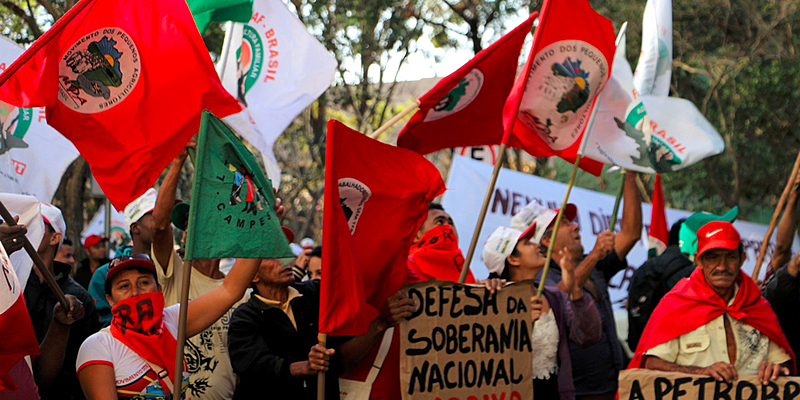
The far-right neoliberal administration of Jair Bolsonaro is a ravenous supporter of the Brazilian agri-business sector and accumulates accusations of human rights violations. It is directly responsible for the sharp increase in the levels of hunger and severe food insecurity that currently hit staggering 33 million Brazilians – 15% of the national population. Implementing the UNDROP in Brazil under such circumstances is both a great challenge and an imperative need for Brazilian rural peoples and their allies. While the UNDROP arrives in Brazil as tool for peasants, movements, organisations and politicians to use in favour of social justice for rural peoples, the implementation of the declaration in Brazil will demand strong mobilisation on the multiple levels of the national politics.
As this article is being written in November 2022, seven MST militants have just been elected to serve for the next four years as parliamentarians in federal and state legislative chambers – including Marina dos Santos who moderated this launching event. This direct representativity at the heart of Brazilian politics is indeed a great victory for the advancement of the peasants’ rights agenda in the country, as the UNDROP will be more strongly mobilised in key political arenas. Moreover, the recent win of Lula da Silva over Bolsonaro boosts our hope and enthusiasm towards the struggle of implementing the UNDROP in Brazil. With Lula back to power, a more prosperous future waves at us with excitement. As Brazilian democracy sighs in relief, our struggle continues with extra strength!

